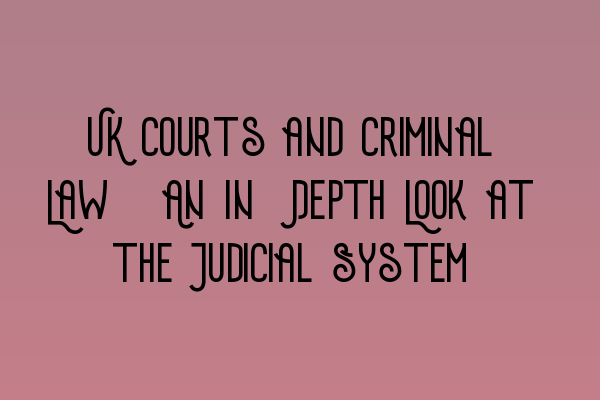UK Courts and Criminal Law: An In-Depth Look at the Judicial System
Welcome to SQE Criminal Law & Practice Law UK, where we provide comprehensive information and guidance on criminal law in the United Kingdom. In this blog post, we will take an in-depth look at the UK courts and the judicial system. Whether you are a law student, legal professional, or simply interested in understanding the intricacies of the criminal justice system, this article will provide you with valuable insights.
The Judicial System in the UK
The UK judicial system is based on common law principles and is well-regarded around the world for its fairness and impartiality. It is designed to ensure that justice is served and that individuals accused of committing crimes are given a fair trial. The system is composed of various levels of courts, each with specific roles and responsibilities.
The Magistrates’ Court
The Magistrates’ Court is the first level of court in the UK. It handles the majority of criminal cases, including less serious offenses such as minor assaults, theft, and traffic violations. Magistrates, also known as Justices of the Peace, preside over these cases. They are usually non-professional judges who rely on legal advisers for guidance. To get more information about criminal law cases in the Magistrates’ Court, you can refer to our article on SQE 1 Practice Exam Questions.
The Crown Court
The Crown Court is the next level of court in the UK and deals with more serious criminal offenses. These include crimes such as murder, rape, and drug trafficking. The Crown Court is presided over by professional judges known as Circuit Judges, Recorders, and High Court Judges. These judges ensure that trials are conducted fairly and are responsible for sentencing if the defendant is found guilty. For a detailed understanding of how the Crown Court operates, refer to our article on SQE 1 Practice Mocks FLK1 FLK2.
The Court of Appeal
The Court of Appeal is the highest court in the UK that handles criminal appeals. Its role is to review decisions made by the Crown Court and assess whether there were any legal errors that may have affected the outcome of the trial. The Court of Appeal consists of experienced and highly esteemed judges who have extensive knowledge of criminal law. If you are interested in learning more about the appeal process in the UK, our article on SQE 2 Preparation Courses provides valuable insights.
The Role of the Judiciary in Criminal Law Cases
In criminal law cases, the judiciary play a pivotal role in upholding justice and ensuring that the rights of the accused are protected. Judges are responsible for ensuring a fair trial, interpreting the law, and handing down appropriate sentences. They have the authority to admit or exclude evidence, guide the jury, and make decisions on the admissibility of witnesses. For more information on the role of judges, refer to our article on SQE 1 Preparation Courses.
Key Steps in a Criminal Law Case
A criminal law case typically goes through several key steps. These steps include the investigation, arrest, charge, bail hearing, plea, trial, and sentencing. Each step has its own implications and legal requirements. If you want to understand the stages of a criminal law case in detail, our article on SRA SQE Exam Dates provides comprehensive information.
Conclusion
The UK courts and the judicial system play a crucial role in maintaining law and order, ensuring justice is served, and protecting the rights of individuals accused of crimes. Understanding the different levels of courts and the roles of judges is vital to comprehending how the criminal justice system works. We hope this in-depth look at the UK courts and criminal law has provided you with valuable insights. For further resources and information on criminal law, please explore our website.
